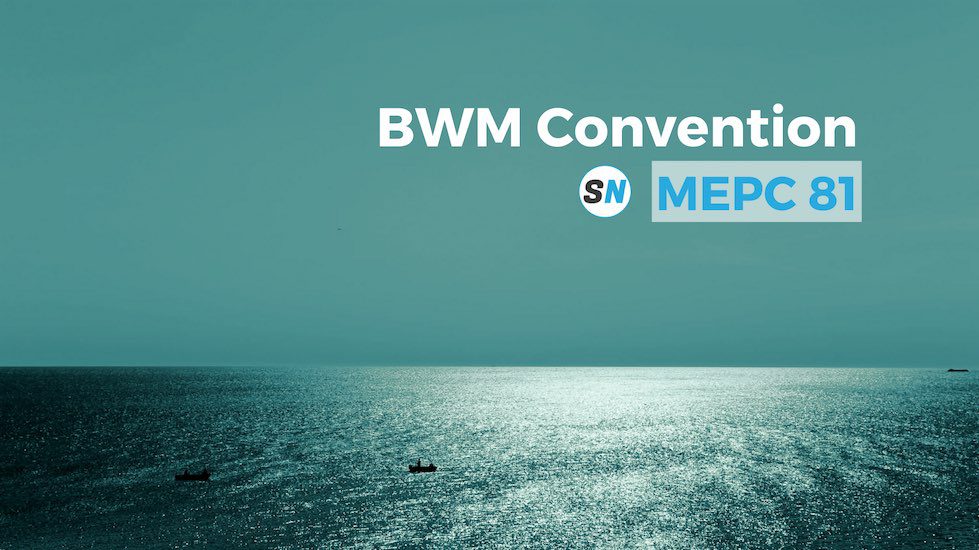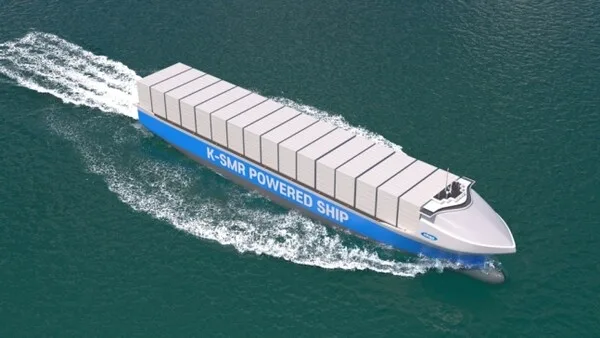28 April 2024
New Wind-Powered General Cargo Vessel with £3.7M UK DFT Grant
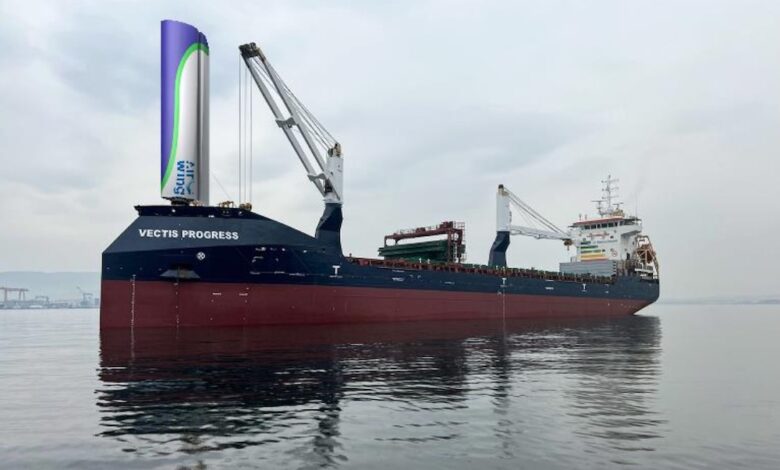
Carisbrooke Shipping along with GT Green Technologies and The University of Bristol to upgrade one general cargo vessel to a wind-powered one. Thanks to a substantial £3.7 million grant win from the UK Department for Transport (DfT).
Table of Contents
Concept
In a ground-breaking collaboration, Carisbrooke Shipping is joining forces with GT Green Technologies and The University of Bristol to spearhead a revolutionary shift in commercial shipping. Thanks to a substantial £3.7 million grant win from the UK Department for Transport (DfT), Carisbrooke is set to install a 20-meter AirWing™ unit on one of its UK-registered vessels, marking a significant leap towards sustainable and eco-friendly maritime practices with a wind-powered ship.
The AirWing™ Advantage
At the heart of this transformation is AirWing™, a cutting-edge wind-powered propulsion solution designed by GT Green Technologies. This innovative technology, boasting patent-pending airflow manipulation, promises to maximize thrust output while maintaining a compact and lightweight profile. Particularly crucial for general cargo ships with limited deck space, the wind-powered system addresses the urgent need for sustainable shipping solutions.
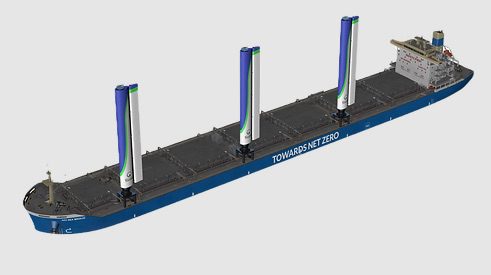
Carisbrooke Shipping Goes Wind-Powered
With oversight of the technical management of a global fleet comprising 27 vessels, Carisbrooke Shipping is strategically positioned as the trailblazer for integrating wind-powered technology. Capt. Simon Merritt, Senior Fleet Manager at Carisbrooke Shipping, shared his enthusiasm for this pioneering move:
“We’ve been in talks with GT Green for the past two years and are thrilled to be prototyping their AirWing concept in 2024. The utilization of AirWing technology will reduce operating costs through lower fuel consumption and emissions (the expected range can be 5 – 30% depending on the configuration), further enhance the vessel’s green credentials and alleviate the tax burden for our ship operators. The installation will take place on one of our UK-registered vessels, with all design and construction carried out right here in the UK.”
Capt. Simon Merritt, Senior Fleet Manager, Carisbrooke Shipping
Artist’s impression of a 20-metre AirWing™ unit to be installed on Carisbrooke Shipping’s wind-powered general cargo vessel can be seen on the cover.

The World’s Most Powerful Windpower Cargo Ship
Berge Bulk, launches its wind-powered Newcastlemax bulker, with four retrofitted BARTech WindWings by Yara Marine Technologies.
Ship Nerd
The University of Bristol’s Expertise
Adding academic prowess to this collaboration is The University of Bristol, contributing expertise in composite structures testing and modeling. Tobias Laux, a Research Associate at the university, emphasized the importance of cross-disciplinary research in fluid dynamics, structures, and ship science to fully harness the potential of wind-powered propulsion.
Carisbrooke Shipping is a winner of the prestigious Maritime UK Solent award in the Technology Game Changer category 2023 and is proud to be at the forefront of the CMDC initiative, showcasing a commitment to sustainability and innovation in the shipping industry.
Clean Maritime Demonstration Competition
This project is part of the Clean Maritime Demonstration Competition Round 4 (CMDC4), funded by the UK Department for Transport (DfT) and delivered by Innovate UK. CMDC4 is part of the Department’s UK Shipping Office for Reducing Emissions (UK SHORE) program, a £206m initiative focused on developing the technology necessary to decarbonize the UK domestic maritime sector.
In March 2022, the UK Government announced the biggest government investment ever in our UK commercial maritime sector, allocating £206m to UK SHORE, a new program within the Department for Transport focused on decarbonizing the maritime sector. UK SHORE is delivering a suite of interventions throughout 2022-2025 aimed at accelerating the design, manufacture, and operation of UK-made clean maritime technologies and unlocking an industry-led transition to Net Zero.
The UK SHORE program includes the flagship multi-year Clean Maritime Demonstration Competition (CMDC) which provides match-funding to help bring pre-commercial technologies closer to market readiness. CMDC4 allocated £33m to 33 projects across the UK to deliver demonstrations, pre-deployment trials, and feasibility studies between April 2024 – March 2025. The projects are supported by over 120 partners and will leverage more than £16m of private investment.
CMDC4 follows the successful first three rounds of the CMDC, which allocated over £95m to 105 projects. CMDC1 was launched in 2021, prior to UK SHORE.
See Also
A lifecycle assessment (LCA) provides an objective approach for comparing future marine fuels that are produced from renewable energy while accounting for their greenhouse gas (GHG) emissions footprint at every step of their lifecycle from the point of production until the point of use. Greenhouse Gas emissions pose an existential threat to humanity through global warming and climate change. Maritime shipping is almost wholly reliant on the combustion of fossil fuels with resultant carbon dioxide equivalent emissions and significant contributions to air pollution from oxides of nitrogen, sulphur, and particulate matter combustion products.
The future route to fuelling ships is likely to be from renewable energy resources. A benchmarking process of the three main alternatives of ammonia, methanol, and hydrogen must be used, to identify the fuel that requires the least amount of renewable energy investment compared to the energy required to propel a ship through the water, at the same time as minimizing air pollution. Hydrogen is likely to be the most cost-effective solution with the unit of renewable electricity required to produce an amount of storage energy as fuel, being an effective measure for the overall cost and lowest environmental harm.
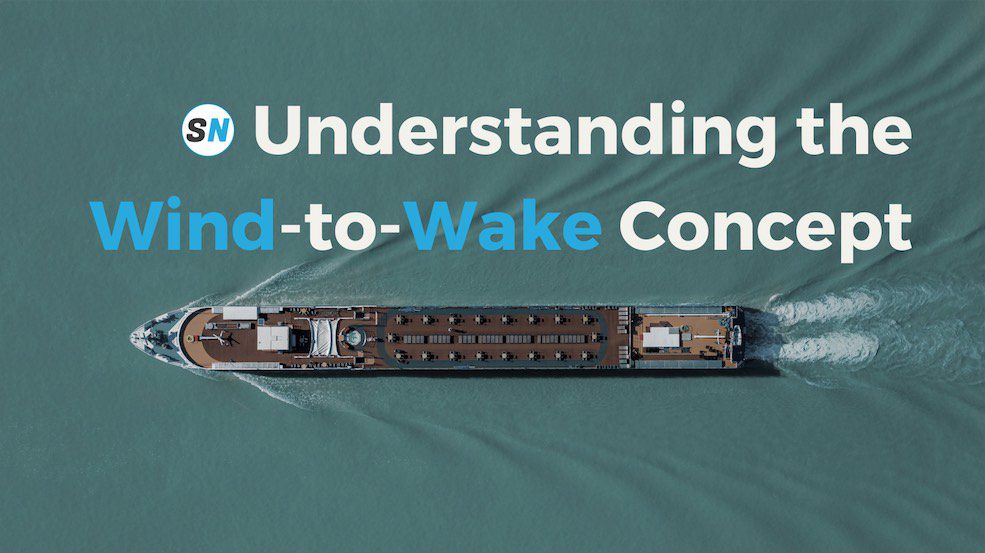
Wind-to-Wake Concept for Shipping Decarbonization
Shipping decarbonization goes beyond the norm. Get up to speed with Wind-to-Wake, the updated method of lifecycle assessment for green fuels.

